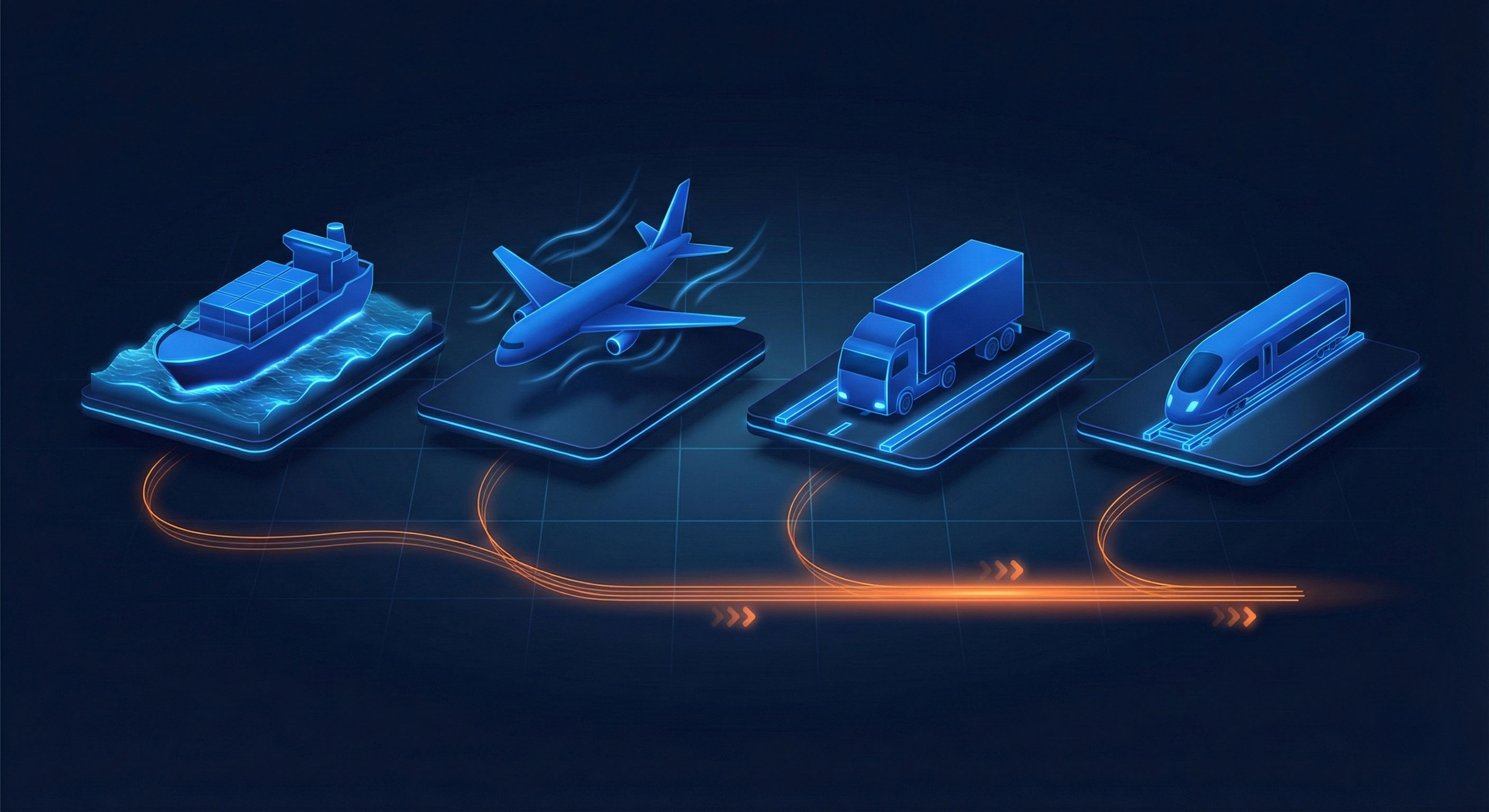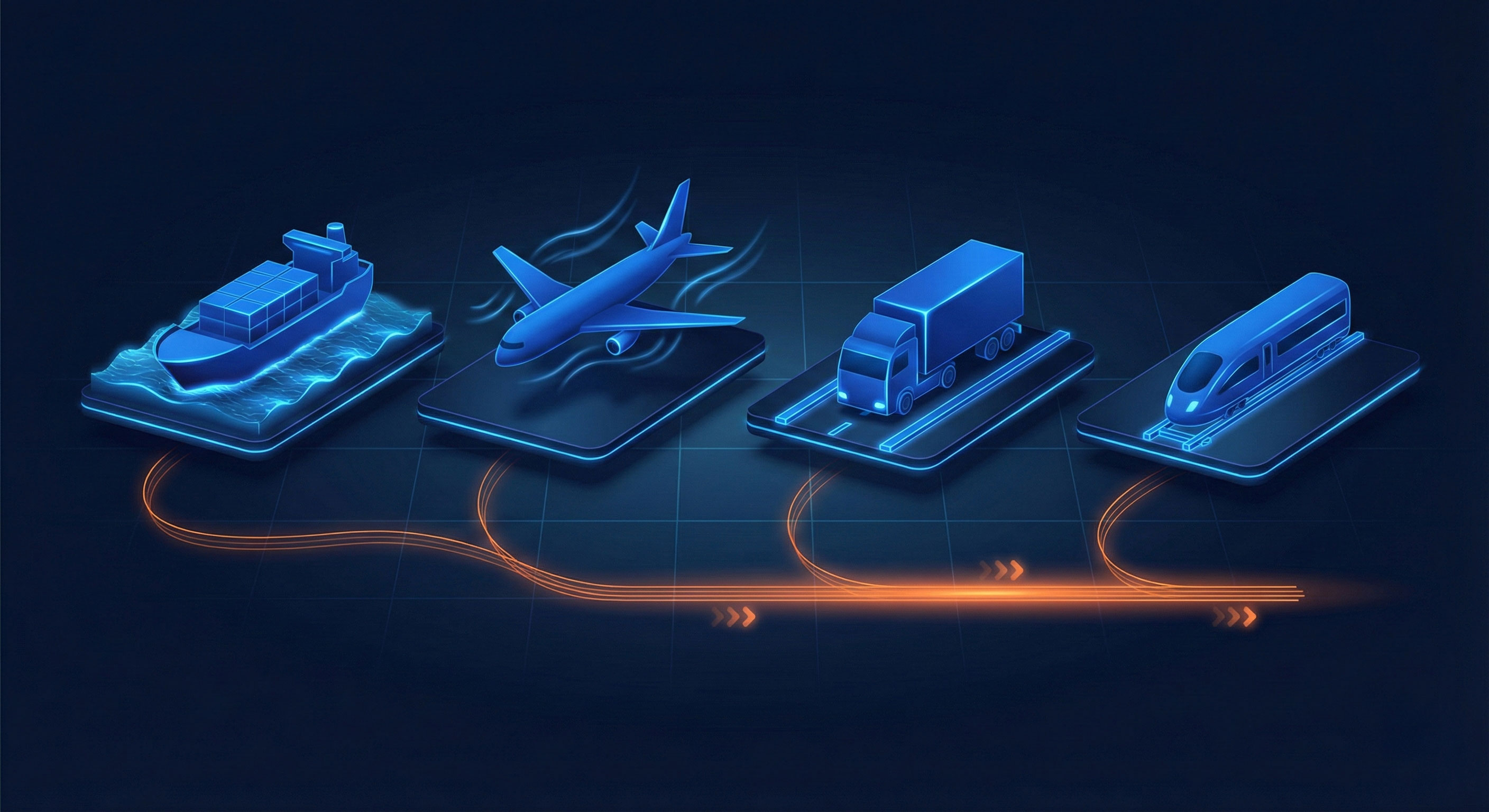
The Types and Modes of Transportation
Trade Compliance
Importer of Record (IOR)
Exporter of Record (EOR)
Freight Forwarding

Every business faces the challenge of selecting the most efficient mode of transportation for their goods. With options like road, rail, air, and sea, it can be confusing to decide which one is best. Understanding the strengths and limitations of each method of transportation is crucial for optimizing your operations. Whether you’re shipping time-sensitive products or looking to reduce costs, making the right choice can significantly impact your bottom line.
Continue reading to discover the various transportation modes and learn how selecting the right one can streamline your logistics and drive your business’s growth.
What are Modes of Transportation?
In logistics, Modes of transportation refer to the different methods used to move goods from one location to another. These methods are critical for ensuring the efficient and timely delivery of goods. A solid understanding of transportation modes enables businesses to streamline their supply chains, reduce costs, and enhance delivery performance
The main options include road, rail, water, and air. The choice of mode is based on factors such as cost, speed, and the nature of the goods, allowing businesses to make informed decisions that optimize their operations.
Importance of choosing the right mode of transportation
Choosing the right mode is a critical decision for businesses, as it directly affects supply chain performance and overall operations. The importance of this choice lies in its impact on efficiency, cost control, and reliability. In the end, selecting the appropriate mode is essential for the following reasons:
Efficiency
Ensures timely delivery of goods, minimizing delays in the supply chain.
Cost-effectiveness
Helps control shipping expenses by selecting the most suitable method.
Reliability
Reduces the risk of disruptions and damage to goods, ensuring reliable service.
Environmental Impact:
Minimizes the environmental footprint by choosing the most eco-friendly option.
Customer Satisfaction
Timely and reliable delivery improves customer satisfaction and loyalty
Profitability
Directly impacts the bottom line by optimizing costs and delivery times.
Competitive Advantage
Efficient logistics operations give businesses an edge in the marketplace.
Sustainable Growth
Supports long-term business growth by improving operational efficiency and reducing waste.
Types of Transportation Modes
Road Transportation
Road transport involves using vehicles such as cars, buses, trucks, and motorcycles. It is known for its flexibility, as it can reach nearly any destination, making it ideal for short to medium distances. This mode is commonly used for both personal travel and freight delivery.
Advantages of Road Mode
Door-to-door service: Direct delivery to the destination minimizes the risk of lost packages.
Flexibility: Can accommodate a variety of cargo, from small parcels to larger shipments.
Accessibility: Reaches remote or hard-to-access locations that other transport modes cannot.
Disadvantages of Road Mode
Traffic delays: Urban congestion can cause significant delays.
Variable fuel prices: Fluctuating fuel costs can impact overall shipping expenses.
Environmental impact: Road transport contributes to higher carbon emissions than other modes.
Rail Transportation
Rail transport uses trains to move passengers or goods over long distances. It is known for being reliable, efficient, and cost-effective for bulk shipments, making it ideal for transporting large quantities of goods over land.
Advantages of Rail Mode
Large capacity: Trains can carry a significant amount of cargo over long distances.
Reliability: Offers predictable schedules and fewer delays compared to road transport.
Eco-friendly: Rail transport produces lower emissions per mile than road transport.
Disadvantages of Rail Mode
Limited flexibility: Trains can only operate on established rail tracks, restricting access to certain areas.
High infrastructure costs: Building and maintaining rail networks require substantial investment.
Extra handling: Additional logistics are necessary to move goods to and from stations.
Air Transportation
Air transport involves using airplanes to move goods quickly, particularly for long-distance or international shipments. It is the fastest mode of transportation, making it essential for urgent deliveries.
Advantages of Air Mode
Speed: Air transport is the fastest way to move goods, especially over long distances.
Urgency: Ideal for time-sensitive shipments that need quick delivery.
Global reach: Provides access to international markets.
Security: Air freight typically has high levels of safety and security for goods.
Disadvantages of Air Mode
High cost: Air freight is significantly more expensive than other modes of transport.
Regulatory complexity: Air transport is highly regulated, requiring detailed documentation and compliance with rules.
Environmental impact: Airplanes have a higher carbon footprint than other transport methods.
Sea Transportation
Water transport uses ships and boats to move goods across seas and oceans, particularly for international trade. It is ideal for transporting large quantities of goods at a lower cost.
Advantages of Sea Mode
Capacity: Ships can carry vast amounts of cargo, making it suitable for bulk shipments.
Cost-effective: Water transport is more affordable for heavy and large cargo.
Flexible fleet: Offers various vessel sizes to meet different shipping needs.
Disadvantages of Sea Mode
Slow speed: Sea transport is slower than air and rail, leading to longer lead times.
Weather dependency: Shipments can be delayed due to adverse weather conditions.
Port reliance: Dependent on port infrastructure and subject to international shipping regulations.
Optimize Your Logistics Today
Are you ready to optimize your logistics and select the ideal transportation mode for your business? At IOR Africa, we offer specialized services that ensure your shipments are smooth, compliant, and cost-effective. Whether you’re transporting goods by road, air, or sea, our team is here to help you reduce shipping delays and serve as your international export compliance experts.
Fill out our form today to elevate your logistics strategy and drive your global business forward!
Request Form
Written by Ahmed Abo El-Enein
Ahmed Abo El-Enein is a content writer with several years of experience in logistics, trade compliance, and global supply chains. He focuses on producing clear, practical content that helps businesses understand customs regulations, manage cross-border challenges, and stay aligned with international trade trends.
